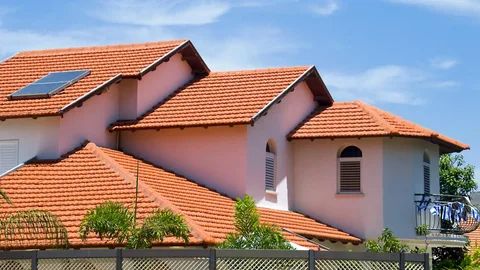Is Tile Roofing the Right Choice for Your Home?
If you’re seeking a roofing material that blends aesthetics, performance, and longevity, tile roofing might be your ideal solution. For centuries, tile has been a top choice in Mediterranean, Spanish, and Southwestern architecture—and with today’s modern manufacturing, it’s more durable and versatile than ever.
At Weather Proofing Roofing, we’ve helped countless property owners transition to tile roofing. Whether you’re building a new home or replacing an aging roof, this guide will help you understand the key benefits and considerations of tile roofing.
What Is Tile Roofing?
Tile roofing typically consists of clay, concrete, or slate tiles arranged in overlapping rows. Known for their distinctive style and long life span, these tiles provide a tough barrier against the elements while enhancing a building’s visual appeal.
Popular types include:
- Clay tiles – Traditional and aesthetically rich
- Concrete tiles – More affordable and customizable
- Slate tiles – Elegant and highly durable (though heavier)
Benefits of Tile Roofing
1. Incredible Longevity
One of the top reasons people choose tile roofing is its lifespan of 50 to 100 years. This longevity makes it an excellent investment for long-term property value and peace of mind.
2. Weather Resistance
Tile roofs stand up well to extreme weather, including wind, hail, and fire. Their weight and design help them resist uplift and cracking. In areas with hot climates or heavy rainfall, tile remains a top-performing material.
3. Energy Efficiency
Tile naturally insulates and reflects sunlight, which helps regulate indoor temperatures. That’s especially useful for buildings using rooftop HVAC systems rated for 1 ton or more per zone. With better thermal regulation, your HVAC system works more efficiently, potentially saving energy and money.
4. Beautiful Appearance
Tile roofing offers timeless beauty. Whether you prefer rustic terracotta or sleek slate-gray, there’s a tile option to complement your architecture. It significantly boosts curb appeal and property value.
5. Eco-Friendly Materials
Many tile roofing materials are recyclable and sustainably sourced. Clay and concrete tiles, in particular, are made from natural earth minerals and produce minimal environmental impact.
Considerations Before You Install
While tile roofing has numerous benefits, it’s not for every structure or budget. Here are a few things to think about:
1. Weight
Tile is heavy—up to 10 pounds per square foot. Some structures may need reinforcement to support it, especially if rooftop systems like solar panels or HVAC units for 1 ton of capacity are already present.
2. Cost
Tile roofing has a higher upfront cost than asphalt shingles, but its low maintenance and longevity often justify the price over time.
3. Installation Skill
Installing tile requires precision. Poor installation can lead to cracked tiles or water leaks. Always choose a contractor with experience, like Weather Proofing Roofing, to ensure it’s done right.
Maintenance and Repairs
Tile roofs are relatively low-maintenance but should be inspected annually. Common issues include:
- Cracked or broken tiles (often from foot traffic or falling debris)
- Moss or mold buildup
- Clogged gutters and valleys
When repairs are needed, it’s usually simple to replace individual tiles without touching the whole roof. This makes maintenance cost-effective in the long run.
Is Tile Roofing Right for You?
If you want a long-lasting, attractive, and environmentally responsible roof, tile could be a perfect fit. It’s especially well-suited to warmer climates or architectural styles where aesthetics matter just as much as durability.
At Weather Proofing Roofing, we specialize in custom tile roofing solutions for both residential and commercial properties. Our experienced team will help you choose the right type of tile, handle all permitting, and ensure expert installation from start to finish.
FAQs About Tile Roofing
1. How long does a tile roof last?
Tile roofs can last 50 to 100 years or more with proper maintenance, making them one of the longest-lasting roofing options available.
2. Are tile roofs suitable for cold climates?
Yes—but you’ll need to use freeze-resistant tiles and ensure proper installation to prevent cracking due to freeze-thaw cycles.
3. How much does tile roofing cost?
The cost varies by material and location but generally ranges from $10 to $20 per square foot installed. While more expensive than shingles, it pays off over time.
4. Can I walk on a tile roof?
It’s not recommended. Tiles can crack under weight, so walking should be done only by professionals with the proper equipment and training.
5. Do tile roofs require special maintenance?
Not special, but regular inspections help. Clearing debris and replacing broken tiles promptly will keep your roof in great condition for decades.

